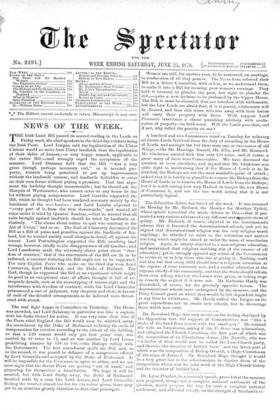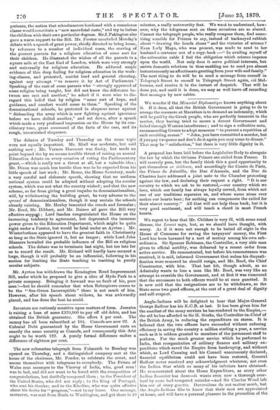Dr. Lyon Playfair, in a masterly speech, proved that the
measure now proposed, though not a complete national settlement of the question, would prepare the way for such a complete national settlement, and ridiculed utterly, on the strength of Scotland's ex- perience, the notion that schoolmasters burdened with a conscience clause would constitute a "new sacerdotal caste," and try to imbue the children with their own particular dogmas. SirJ.Pakington also gave a warm support to the Bill. Mr. Forster concluded Monday's debate with a speech of great power, chiefly directed to bring home, by reference to a number of individual cases, the craving of the poorest parents for a religious education of some sort for their children. He illustrated the wishes of all the parents in a square mile at the East End of London, which were very strongly and universally for religious education. He adduced ample evidence of this deep feeling for religious education in the work- ing-classes, and protested, amidst loud and general cheering, against any attempt " to remove it by Act of Parliament." Speaking of the case of some parents who " strongly approved of some religion being taught, but did not know the difference be- tween one sect and another," he asked if it were wise to dis- regard this belief that by religion " some sort of hope, and guidance, and comfort would come to them." Speaking of the denominational schools, he protested in eloquent terms against " disbanding the army which is now fighting against ignorance before we have drilled another," and sat down, after a speech which made a very profound impression on the House by its con- ciliatory tone, great command of the facts of the case, and its rough, unvarnished eloquence.





























